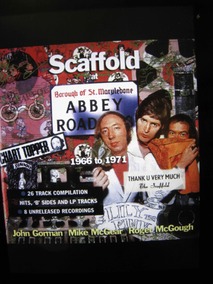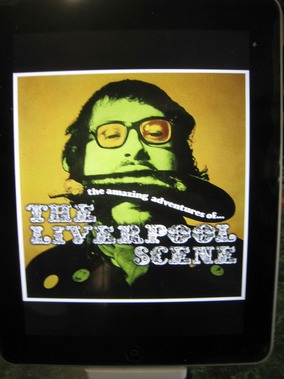 Given the time gap there's no way of fathoming why that should be so, and using pencilled asterisks in the index isn't the most scientific research tool, but I suspect McGough's rather poppier offerings worked better in that setting than Henri's more consciously poetic approach.
Given the time gap there's no way of fathoming why that should be so, and using pencilled asterisks in the index isn't the most scientific research tool, but I suspect McGough's rather poppier offerings worked better in that setting than Henri's more consciously poetic approach.
Interesting, because forty years later a listen to both albums suggests Henri's Liverpool Scene have aged rather better than McGough's Scaffold. Both, of course, need to be approached as period pieces that are very much a product of the times, with or without a substantial side serving of nostalgia and fond memory.
There's also (one suspects, in the absence of empirical evidence) a degree of difference in approach based on the presence or otherwise of actual musicians with actual chops, a significant variation in the sort of live work each outfit was able to manage and, more than likely, record company issues that differentiated between the EMI-signed Scaffold with the Beatle connection confirmed through Paul McCartney's brother Mike McGear as a member of the trio and the RCA-signed Liverpool Scene.
The third member of Scaffold, apart from poet McGough and singer McGear, was actor John Gorman (allegedly the most loony of the three).
Coming out of a Liverpool arts lab, Scaffold found work around colleges, arts festivals but one suspects that the recorded output was aimed towards a mainstream audience rather than the fringes around the colleges and festivals and much of the material on At Abbey Road 1966 to 1971 would have worked well in environments like TV variety shows. Alongside the familiar hit singles (Thank U Very Much, Lily the Pink and Do You Remember, catchy little lightweight ditties that were almost guaranteed radio airplay) there's a strong element of Gang Show (Gin Gan Goolie) and Rugby song (2 Day's Monday) in a collection that is rather light on for the pop poetry I was looking for. Still, at $10.99…

Henri's Liverpool Scene, on the other hand, while emerging from the same arts lab scene, headed towards the fringes rather than the mainstream, featuring on underground DJ John Peel's radio shows and included guitarists Andy Roberts and Mike Hart, who had substantial musical chops and went on to develop solo careers.
You'll still find Henri's portentous poetics predominating the mix, but the vocal and instrumental contributions from the others add light and shade to something that's very much a product of its time but provides an interesting listening experience.
Given the price, it's a collection that needs to be approached with caution and sampled at length, but with over two and a half hours of material The Amazing Adventures of the Liverpool Scene weighs in as good value for money as far as Hughesy's concerned.
Your own mileage, of course, may vary.